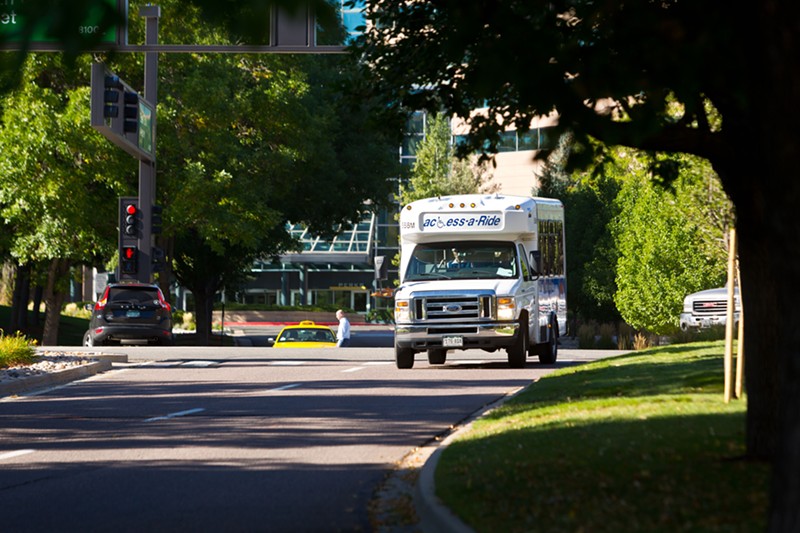Sophie Turner lives in the Lowry neighborhood and commutes to work using public transportation. Turner is developmentally delayed and relies on Access-a-Ride, the Regional Transportation District's door-to-door service for people with disabilities, paying five dollars one way.
Access-a-Ride might be door-to-door, but that doesn't mean passengers have a better chance of arriving to their destination on time. Chronic lateness is a major issue for the service, users say.
"We’ve been trying to get this resolved for years," says Turner's mother, Melanie Weiss-Turner. "To me, it’s a global issue with Access-a-Ride. It’s not just about my daughter. It’s about all the people with special needs who use that service."
Disability-rights advocates say Turner's experience is by no means unique.
"That’s very common. We hear that a lot," says Jaime Lewis, a transportation advocate at the Colorado Cross Disability Coalition.
From October 1, 2018, through March 31, 2019, Turner used Access-a-Ride 95 times. RTD reviewed the rides and classified 28 as late, meaning only 70.5 percent were what RTD considers on time, well below the transportation district's goal of 86 percent.
In a July 31 email to Weiss-Turner, RTD chief operations officer Michael Ford conceded that the delays were "unacceptable."
"Currently, all of our Access-a-Ride contractors are maximizing every opportunity regarding recruitment," Ford wrote Weiss-Turner. "Everything from wage increases to bonuses are being utilized as a means of minimizing their headcount gap. We are expecting this trend to turn so that we may, once again, focus our attention on service improvements."
RTD contracts with Via Mobility and MV Transportation, driver agencies that specialize in transporting people with disabilities, for Access-a-Ride drivers.
"The delays we’re experiencing are rooted in the issue of manpower," says RTD spokeswoman Tina Jaquez. "[The contractors], like us, are having a hard time filling operator positions."
Access-a-Ride is 39 drivers short of its target of 490. And according to figures from May, the most recent available, RTD's bus system is short 75 full-time drivers of its goal of 945, and its light-rail system is short 42 operators of its goal of 216.
Lewis of CCDC says Access-a-Ride drivers are struggling to pick up the extra load. "The biggest complaint I get from the drivers themselves is that they’re given itineraries that are impossible to complete. They say, 'I know I'm not going to be able to finish in the time I'm allotted to have,'" he explains.
Advocates say that drivers occasionally have to carry so many passengers, they'll end up taking someone who is only going a short distance on an unnecessarily long ride. "They drive you all over God’s green earth. They’ll drive you past your house like three times," says Kevin Williams, legal director at CCDC.
According to RTD, the lack of drivers stems from the U.S.'s low unemployment rate. When the labor market is tight, fewer workers are willing to become public transportation drivers.
"We're looking overall at how can we retain operators, how can we hire people, how can we keep them, how can we hire younger people," says Jaquez.
Access-a-Rides were on time by RTD standards 85.9 and 85.3 percent in June and July, respectively, which are similar results to what RTD sees for its fixed-route system. Access-a-Rides give drivers half-hour pick-up windows. Once that window passes, RTD classifies the ride as late.
"Paratransit is a life-changer for people who cannot use a fixed route. But it’s also the destroyer of lives. I’ve known people who have lost their jobs for being late," says Douglas Howey, a CCDC advocate who uses Access-a-Ride and has been pushing RTD to improve the service.
Weiss-Turner says RTD is not doing enough to fix this issue. "We’ve been trying to get this resolved for years," she says. "I’m not unsympathetic, but they’re just not being creative."
Lewis says RTD is exploring the possibility of striking a deal with ride-sharing companies like Uber and Lyft to provide some relief to the strained Access-a-Ride service. But Paul Hamilton, senior manager of transit services at RTD, concedes that most Uber and Lyft drivers don't have wheelchair-accessible vehicles.
"We don’t want to create another non-accessible alternative," says Hamilton. "We have multiple standards required by the ADA. We need to have the same response time for all people regardless of their disability."
[
{
"name": "Air - MediumRectangle - Inline Content - Mobile Display Size",
"component": "12017618",
"insertPoint": "2",
"requiredCountToDisplay": "2"
},{
"name": "Editor Picks",
"component": "17242653",
"insertPoint": "4",
"requiredCountToDisplay": "1"
},{
"name": "Inline Links",
"component": "18838239",
"insertPoint": "8th",
"startingPoint": 8,
"requiredCountToDisplay": "7",
"maxInsertions": 25
},{
"name": "Air - MediumRectangle - Combo - Inline Content",
"component": "17261320",
"insertPoint": "8th",
"startingPoint": 8,
"requiredCountToDisplay": "7",
"maxInsertions": 25
},{
"name": "Inline Links",
"component": "18838239",
"insertPoint": "8th",
"startingPoint": 12,
"requiredCountToDisplay": "11",
"maxInsertions": 25
},{
"name": "Air - Leaderboard Tower - Combo - Inline Content",
"component": "17261321",
"insertPoint": "8th",
"startingPoint": 12,
"requiredCountToDisplay": "11",
"maxInsertions": 25
}
]













